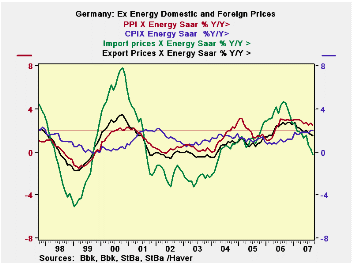 Global| Oct 25 2007
Global| Oct 25 2007Germany: Ex-Energy Inflation Trends are Turning Lower International Prices First
by:Tom Moeller
|in:Economy in Brief
Summary
Domestic inflation is the more nettlesome here The less than one year in duration statistics in the table below are not as meaningful for export and import prices as they are not seasonally adjusted. But overall the trends in the [...]

Domestic inflation is the more nettlesome here…
The less than one year in duration statistics in the table below are not as meaningful for export and import prices as they are not seasonally adjusted. But overall the trends in the table and in the chart show that inflation is in pretty good shape. Nonpetroleum inflation is keeping its head down. The reference line on the chart drawn at 2% shows that only the nonpetroleum PPI and CPI prices are edging above it. History shows us that when international prices turn lower that does not translate quickly into domestic prices becoming calm. In 2001 when import prices fell sharply it took about one year before the domestic ex-energy CPI responded.
Of course what happens with oil prices and with food prices does matter. We focus on ex energy prices mostly to rid ourselves of the volatility, but at the same time we see that it provides coherence in the relationships among domestic and international prices of various sorts.
| German International and Domestic Inflation Trends | |||||||
|---|---|---|---|---|---|---|---|
| % m/m | % Saar | ||||||
| SA: | Sep-07 | Aug-07 | Jul-07 | 3-Mo | 6-Mo | 12-Mo | Yr-Ago |
| Export Prices | -0.1% | 0.1% | -0.1% | -0.4% | 1.3% | 1.6% | 2.3% |
| Import Prices | 0.6% | -1.3% | 0.1% | -2.6% | 3.2% | 1.3% | 3.7% |
| NSA | |||||||
| Exp excl Petrol | 0.0% | 0.0% | 0.1% | 0.4% | 1.1% | 1.5% | 2.5% |
| Imp excl Petrol | -0.2% | -0.1% | -0.4% | -2.7% | -0.8% | -0.2% | 4.6% |
| Memo: SA | |||||||
| CPI | 0.3% | 0.1% | 0.3% | 2.5% | 2.7% | 2.4% | 1.0% |
| CPI excl energy | 0.3% | 0.2% | 0.2% | 2.6% | 2.4% | 2.0% | 1.0% |
| PPI | 0.1% | 0.2% | -0.1% | 0.7% | 1.7% | 1.5% | 5.1% |
| PPI excl Energy | 0.0% | 0.4% | 0.1% | 1.8% | 2.7% | 2.5% | 2.9% |
Tom Moeller
AuthorMore in Author Profile »Prior to joining Haver Analytics in 2000, Mr. Moeller worked as the Economist at Chancellor Capital Management from 1985 to 1999. There, he developed comprehensive economic forecasts and interpreted economic data for equity and fixed income portfolio managers. Also at Chancellor, Mr. Moeller worked as an equity analyst and was responsible for researching and rating companies in the economically sensitive automobile and housing industries for investment in Chancellor’s equity portfolio. Prior to joining Chancellor, Mr. Moeller was an Economist at Citibank from 1979 to 1984. He also analyzed pricing behavior in the metals industry for the Council on Wage and Price Stability in Washington, D.C. In 1999, Mr. Moeller received the award for most accurate forecast from the Forecasters' Club of New York. From 1990 to 1992 he was President of the New York Association for Business Economists. Mr. Moeller earned an M.B.A. in Finance from Fordham University, where he graduated in 1987. He holds a Bachelor of Arts in Economics from George Washington University.
More Economy in Brief
 Global| Feb 05 2026
Global| Feb 05 2026Charts of the Week: Balanced Policy, Resilient Data and AI Narratives
by:Andrew Cates






